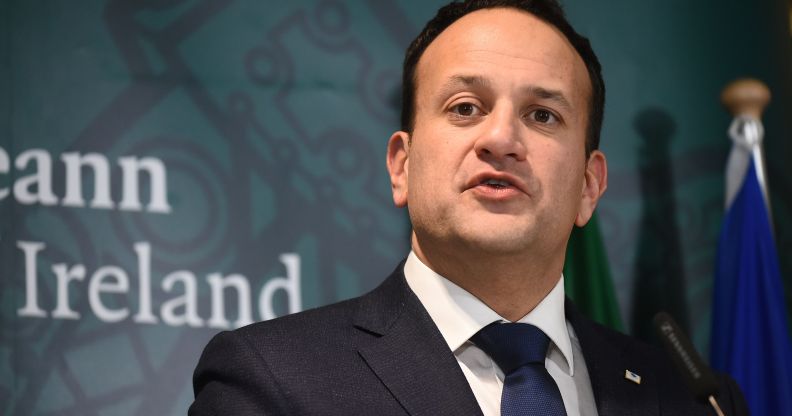Irish Minister Leo Varadkar delivers heartfelt plea for equal marriage

Jack Taylor/Getty
Ireland’s Minister for Health Leo Varadkar – who came out as gay earlier this year – has delivered a stirring speech in favour of same-sex marriage.
The Irish TD took to the floor of the Dáil to speak in support of legislation to back the country’s referendum on same-sex marriage, which is set to take place on May 22.
Mr Varadkar quoted Irish revolutionary Daniel O’Connell, saying: “The spirit of self is a great evil; the love of superiority is a great evil. The liberty which I look for is that which would increase the happiness of mankind.”
In his speech, he said: “Throughout history there are numerous examples of good people being on the wrong side of history. We are reluctant to change, and so it is often easier to accept the way things have always been.
“Why risk what change might bring? Fifty years ago women could not serve on juries in this country and had to resign from the Civil Service when they got married, two things that seem unbelievable today but which were supported at the time by many good and honourable people who were unable to see the damage these policies were causing, or the validity of the arguments on the other side, which they often saw as radical, rather than just modern.
“This is a Bill which asks us to act as legislators for the whole country, for future generations, and to do something that will benefit all of society in the long run.
“This is not a Bill about ‘gay marriage’, it is about ‘equal marriage’. It is not about weakening one of the strongest institutions in society, it is about strengthening it by making it inclusive and for everyone.
“It is about removing the sense of shame, isolation and humiliation from many who feel excluded. It lets them know that Ireland is a country which believes in equality before the law for all its citizens.
“This Bill allows allow gay men and women, for the first time, to be equal citizens in their own country. No exceptions; no caveats; no conditions; just equal. This is not an act of generosity to a minority, rather it is an act of leadership by the majority.
“It is a recognition that the majority does not become superior by making another group feel inferior. It recognises that same-sex relationships are equal to opposite-sex relationships, and by doing so, all are enhanced and neither is diminished.
“In this House we have heard strong support from all sides for marriage equality but we must not allow this to be a campaign where we talk to those who are already committed.
“There are good and honourable people in the country who are unsure about marriage equality. They are not prejudiced. They just have concerns. We should not dismiss or ignore their concerns, but should attempt to answer, address and alleviate them.”
“It is up to us to convince them that this change is one for the better.
“Perhaps one way is to ask everyone to think of the best marriage they know, the one that is the most loving, the most stable, and the most inspiring, and then ask ourselves a few simple questions.
“Is that marriage any more likely to break up because two men or two women down the road get married? Did the introduction of divorce really undermine any of those marital relationships or did they survive untouched?
“Did the end of the marriage bar undermine marriage or did the institution survive intact?
“Those who speak loudest against marriage equality proclaim that marriage is a fundamental building block of our society, yet they seem to think it is such a fragile institution that it needs to be wrapped in cotton wool, frozen in time and denied to those they do not trust or understand.
“Instead of being real champions of marriage, they are almost afraid of it because they do not believe it is robust enough to withstand change, evolution and modernity.
“We believe in marriage as an institution, and so we believe equal marriage makes it stronger and makes society stronger too.”

